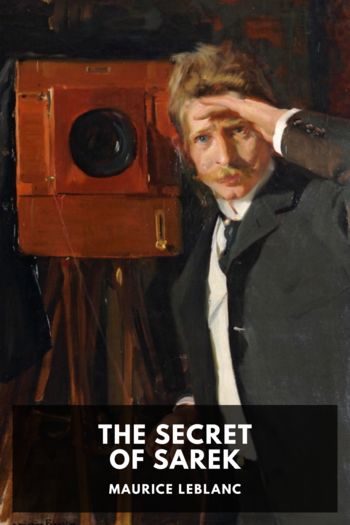The Eight Strokes of the Clock, Maurice Leblanc [summer books TXT] 📗

- Author: Maurice Leblanc
Book online «The Eight Strokes of the Clock, Maurice Leblanc [summer books TXT] 📗». Author Maurice Leblanc
“Silent?”
“Yes, there’s a man and woman sitting behind us who seem to be saying something uncommonly interesting.”
“But they’re talking in whispers.”
“Just so. When people talk in whispers, it’s always about something shady.”
He lit a cigarette and sat back in his chair. Hortense listened, but in vain. As for him, he was emitting little slow puffs of smoke.
Fifteen minutes later, the train stopped and the man and woman got out.
“Pity,” said Rénine, “that I don’t know their names or where they’re going. But I know where to find them. My dear, we have a new adventure before us.”
Hortense protested:
“Oh, no, please, not yet! … Give me a little rest! … And oughtn’t we to think of Geneviève?”
He seemed greatly surprised:
“Why, all that’s over and done with! Do you mean to say you want to waste any more time over that old story? Well, I for my part confess that I’ve lost all interest in the man with the two mammas.”
And this was said in such a comical tone and with such diverting sincerity that Hortense was once more seized with a fit of giggling. Laughter alone was able to relax her exasperated nerves and to distract her from so many contradictory emotions.
IV The Telltale Film“Do look at the man who’s playing the butler,” said Serge Rénine.
“What is there peculiar about him?” asked Hortense.
They were sitting in the balcony at a picture-palace, to which Hortense had asked to be taken so that she might see on the screen the daughter of a lady, now dead, who used to give her piano-lessons. Rose Andrée, a lovely girl with lissome movements and a smiling face, was that evening figuring in a new film, The Happy Princess, which she lit up with her high spirits and her warm, glowing beauty.
Rénine made no direct reply, but, during a pause in the performance, continued:
“I sometimes console myself for an indifferent film by watching the subordinate characters. It seems to me that those poor devils, who are made to rehearse certain scenes ten or twenty times over, must often be thinking of other things than their parts at the time of the final exposure. And it’s great fun noting those little moments of distraction which reveal something of their temperament, of their instinct self. As, for instance, in the case of that butler: look!”
The screen now showed a luxuriously served table. The Happy Princess sat at the head, surrounded by all her suitors. Half-a-dozen footmen moved about the room, under the orders of the butler, a big fellow with a dull, coarse face, a common appearance and a pair of enormous eyebrows which met across his forehead in a single line.
“He looks a brute,” said Hortense, “but what do you see in him that’s peculiar?”
“Just note how he gazes at the princess and tell me if he doesn’t stare at her oftener than he ought to.”
“I really haven’t noticed anything, so far,” said Hortense.
“Why, of course he does!” Serge Rénine declared. “It is quite obvious that in actual life he entertains for Rose Andrée personal feelings which are quite out of place in a nameless servant. It is possible that, in real life, no one has any idea of such a thing; but, on the screen, when he is not watching himself, or when he thinks that the actors at rehearsal cannot see him, his secret escapes him. Look. …”
The man was standing still. It was the end of dinner. The princess was drinking a glass of champagne and he was gloating over her with his glittering eyes half-hidden behind their heavy lids.
Twice again they surprised in his face those strange expressions to which Rénine ascribed an emotional meaning which Hortense refused to see:
“It’s just his way of looking at people,” she said.
The first part of the film ended. There were two parts, divided by an entr’acte. The notice on the programme stated that “a year had elapsed and that the Happy Princess was living in a pretty Norman cottage, all hung with creepers, together with her husband, a poor musician.”
The princess was still happy, as was evident on the screen, still as attractive as ever and still besieged by the greatest variety of suitors. Nobles and commoners, peasants and financiers, men of all kinds fell swooning at her feet; and prominent among them was a sort of boorish solitary, a shaggy, half-wild woodcutter, whom she met whenever she went out for a walk. Armed with his axe, a formidable, crafty being, he prowled around the cottage; and the spectators felt with a sense of dismay that a peril was hanging over the Happy Princess’ head.
“Look at that!” whispered Rénine. “Do you realise who the man of the woods is?”
“No.”
“Simply the butler. The same actor is doubling the two parts.”
In fact, notwithstanding the new figure which he cut, the butler’s movements and postures were apparent under the heavy gait and rounded shoulders of the woodcutter, even as under the unkempt beard and long, thick hair the once clean-shaven face was visible with the cruel expression and the bushy line of the eyebrows.
The princess, in the background, was seen to emerge from the thatched cottage.





Comments (0)